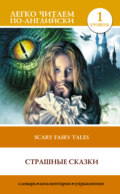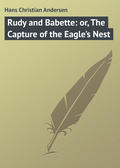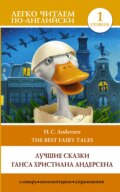
Ганс Христиан Андерсен
The Sand-Hills of Jutland
The Old Bachelor's Nightcap
There is a street in Copenhagen which bears the extraordinary name of "Hyskenstrœde." And why is it so called? and what is the meaning of that name? It is German; but the German has been corrupted. "Häuschen" it ought to be called, and that signifies "small houses." Those which stood there formerly – and, indeed, for several years – were not much larger than the wooden booths that we see now-a-days erected at fairs. Yes, only a little larger, and with windows; but the panes were of horn or stretched bladder, for in these days it was too expensive to have glass windows in all houses; but the time in question was so far back that our grandfathers' grandfathers, when they mentioned it, also spoke of it as "in ancient days," for it was several hundred years ago.
Many rich merchants in Bremen and Lubeck carried on business in Copenhagen. They did not, however, go there themselves – they sent their clerks; and these persons generally resided in the wooden houses in the "Small Houses' Street," and held sales of ale and spices. The German ale was so excellent, and there were so many kinds – "Bremer, Prysing, Emser ale," even "Brunswick Mumme;" also, all sorts of spices, such as saffron, anise, ginger, and especially pepper, that was the most valued; and from this the German commercial travellers acquired the name in Denmark of "Pepper Swains, or Bachelors." They entered into an agreement before they left home not to marry; and many of them lived there to old age. They had to do entirely for themselves, attend to all little domestic matters, even make their own fires if they had any. Several of them became lonely old men, with peculiar thoughts and peculiar habits. Every unmarried man who has arrived at a certain age is now here called after them in derision, "Pebersvend" – old bachelor. It was necessary to relate all this, in order that our story might be understood.
People made great fun of these old bachelors; laughed at their nightcaps, at their drawing them down over their eyes, and so retiring to their couches.
"Saw the firewood, saw it through!
Old bachelors, there's work for you.
To bed with you your nightcaps go;
Put out your lights, and cry, 'O woe!'"
Yes, such songs were made on them. People ridiculed the old bachelor and his nightcap, just because they knew so little about him, or it. Alas! let no one desire such a nightcap. And why not? Listen!
Over in the "Small Houses' Street," in ancient days, there was no pavement; people stepped from hole to hole as in a narrow, cut-up defile; and narrow enough this was, too. The dwellings on the opposite side of the street stood so close together, that in summer a sail was spread across the street from one booth to another, and the whole place was redolent of pepper, saffron, ginger, and various spices. Behind the desks stood few young men; no, they were almost all old fellows; and they were by no means, as we would represent them, crowned with a peruke or a nightcap, and equipped in shaggy pantaloons, a vest and coat buttoned tightly up. This was the costume in which our forefathers were painted, it is true; but this community of old bachelors could not afford to have their pictures taken. Yet it would have been worth while now to have preserved a portrait of one of them, as they stood behind their desks, or on festival days, when they wended their way to church. The hat they wore was broad-brimmed, and with a high crown; and sometimes one of the younger men would stick a feather in his. The woollen shirt was concealed by a deep linen collar; the tight-fitting jacket was closely buttoned, a loose cloak over it; and the pantaloons descended almost into the square-toed shoes, for stockings they wore none. In the belt were stuck the eating knife and the spoon; and, moreover, a large knife as a weapon of defence, for such was often needed in these days.
Thus was equipped, on grand occasions, old Anthon, one of the oldest bachelors of the "small houses;" only he did not wear the high-crowned hat, but a fur cap, and under that a knitted cap, a veritable nightcap, to which he had so accustomed himself that it was never off his head: he actually possessed two of the same description. He would have made an excellent subject for a painter; he was so skinny, so wrinkled about the mouth and the eyes; had long fingers, with such large joints; and his grey eyebrows were so thick. A bunch of grey hair from one of these hung over his left eye: it certainly was not pretty, but it made him very remarkable. It was known that he came from Bremen, at least that his master lived there; but he himself was from Thüringen, from the town of Eisenach, close to Wartburg. Old Anthon spoke little of his native place, but he thought of it the more.
The old lodgers in the street did not associate much with each other. Each remained in his own booth, which, was locked early in the evening, and then looked very dismal; for only a glimmering light could be seen through the horn panes of the window in the roof, beneath which sat, most frequently on his bed, the old man with his German psalm-book, and chanted the evening hymn, or else he went out and strolled about at night by way of amusement; but amusement it could hardly be called. To be a stranger in a foreign country is a very sad situation. No notice is taken of him unless he stands in anyone's way.
Often when it was a pitch-dark night, with pouring rain, all around looked woefully gloomy and desolate. No lanterns were to be seen, except the little one that hung at one end of the street, before the image of the Virgin Mary that adorned the wall there. The water was heard dashing and splashing against the wooden work near, out by Slotsholm, on which the other end of the street opened. Such evenings are always long and lonely if there be nothing to interest one. It is not necessary every day to pack and unpack, to make up parcels, and to polish scales; but one must have something to do, and accordingly old Anthon industriously mended his clothes and cleaned his shoes. When at length he retired to rest, it was his custom to keep on his nightcap. At first he would draw it well down, but he would soon push it up again to look if the light were totally extinguished; nor would he be satisfied without getting up and feeling it. He would then lie down again, and turn on the other side, and again draw down the nightcap; but soon the idea would cross his mind that possibly the coals might not have become cold in the little fire-pot beneath – the fire might not be totally out – that a spark might be kindled, fly forth, and do mischief; and he would get out of his bed and creep down the ladder, for it could not be called the stairs; and when, on reaching the fire-pot, he perceived that not a spark was visible, and he might retire to rest in peace, he would stop half way up, being seized with the fear that the iron bolt might not be properly drawn across the door, or the shutters properly secured; and down he would go again, wearying his poor thin legs. By the time he crept back to his humble couch he would be half frozen, and his teeth would be chattering in his head with the cold. Then he would draw the covering higher up around him, and his nightcap lower down over his eyes, and his thoughts would wander from the business and burdens of the day; but ah! not to soothing scenes. His reveries were never fraught with pleasure, for then came old reminiscences, and hung their curtains up; and sometimes they were full of pins, that pricked so severely as to bring tears into his eyes. Such wounds old Anthon often received, and his warm tears fell on the coverlet or the floor, sounding as if one of sorrow's deepest strings had burst; they did not dry up, but kindled into a flame, which cast its light for him on the panorama of a life – a picture which never vanished from his mind. Then he would dry his eyes with his nightcap, and chase away the tears, and endeavour to chase away the picture with them; but it would not go, for it was imbedded in his heart. The panorama did not follow the exact order of events; also the saddest parts were generally most prominent. And what were these?
"Beautiful are the beech groves in Denmark," it is said; but still more beautiful did the beech trees in the meadows near Wartburg seem to Anthon. Mightier and more majestic seemed to him the old oak up at the proud baronial castle, where the swinging lantern hung over the dark masses of rock; sweeter was the perfume of the apple blossoms there than in the Danish land; he seemed to feel the charming scent even now. A tear trickled down his cheeks, and he saw two little children, a boy and a girl, playing together. The boy had rosy cheeks, yellow waving hair, and honest blue eyes – he was the rich merchant's son, little Anthon himself. The little girl had dark hair and eyes, and she looked bold and clever – she was the burgomaster's daughter Molly. The childish couple were playing with an apple. At length they divided it in two, and each took a half. They also divided the seeds between them, and ate them all to one; and the little girl proposed to plant that in the ground.
"You will see what will come of this – something will come which you can hardly fancy. An apple tree will come up, but not all at once."
And they planted the seed in a flower-pot: both of them were very eager about it. The boy dug a hole in the mould with his finger; the little girl placed the seed in it, and both of them filled up the hole with earth.
"You must not pull it up to-morrow to see if it has taken root," she said; "that should not be done. I did that with my flower: twice I took it up to see if it was growing. I had very little sense then, and the flower died."
The flower-pot was left in Anthon's care, and every morning, the whole winter through, he looked at it; but nothing was to be seen except the black earth. Then came spring; the sun shone so warmly, and two tiny green leaves at last made their appearance in the flower-pot.
"These are Molly and me," said Anthon. "They are charming – they are lovely."
Soon there came a third leaf. Who did that represent? And leaf after leaf came up; while day by day, and week by week, the plant became larger and stronger, until it grew into quite a tree. And another tear fell again from its fountain – from old Anthon's heart.
There stretched out, near Eisenach, a range of stony hills, one of which, round in shape, was very conspicuous: neither tree, nor bush, nor grass grew on it. It was named Mount Venus. Therein dwelt Venus, a goddess from the heathen ages. She was here called Fru Holle, and she knew and could see every child in Eisenach. She had decoyed into her power the noble knight Tannhäuser, the minnesinger, from the musical circle of Wartburg.
Little Molly and Anthon often went to this hill, and she one day said to him, —
"Would you dare to knock on the side of the hill and cry, 'Fru Holle! Fru Holle! open the gate; here is Tannhäuser?' But Anthon dared not do it. Molly dared, however; yet only these words – "Fru Holle! Fru Holle!" – did she say very loudly and distinctly – the rest seemed to die away on the wind; and she certainly did pronounce the rest of the sentence so indistinctly, that Anthon was sure she had not really added the other words. Yet she looked very confident – as bold as when, in the summer evening, she and several other little girls came to play in the garden with him, and when they all wanted to kiss him, just because he would not be kissed, and defended himself from them, she alone ventured to achieve the feat.
"I dare to kiss him!" she used to say, with a proud toss of her little head. Then she would take him round his neck to prove her power, and Anthon would put up with it, and think it all right from her. How pretty and how clever she was! Fru Holle within the hill was also very charming, but her charms, it had been said, sprung from the seducing beauty bestowed on her by the evil one; but still greater beauty was to be found in the holy Elizabeth, the patron saint of the country, the pious Thüringian princess, whose good works, known through traditions and legends, were celebrated in so many places. A picture of her hung in the chapel with a silver lamp before it, but Molly did not resemble her.
The apple tree the two children had planted grew year after year; it became so large that it had to be transferred to the garden, out in the open air, where the dew fell and the sun shone warmly; it became strong enough to withstand the severity of winter, and after winter's hard trials it seemed as if rejoicing in the return of spring: it then put forth blossoms. In August it had two apples, one for Molly and one for Anthon: it would not have been well if it had had less.
The tree had grown rapidly, and Molly had grown as fast as the tree; she was as fresh as an apple blossom, but she was no longer to see that flower. Everything changes in this world. Molly's father left his old home, and Molly went with him – far, far away. In our time it might be only a few hours' journey by railway, but in those days it took more than a day and a night to arrive so far east from Eisenach. It was to the other extremity of Thüringia they had to go, to a town which is now called Weimar.
And Molly wept, and Anthon wept. All these were now concentrated in one single tear, and it had the happy rosy tinge of joy. Molly had assured him that she cared much more for him than for all the grandeur of Weimar.
One year passed on, two passed, and a third followed, and in all that time there came only two letters. One was brought by the carrier, the other by a traveller, who had taken a circuitous course, besides visiting several cities and other places.
How often had not Anthon and Molly heard together the story of Tristand and Isolde, and how often did not Anthon think of himself and Molly as them! Although the name "Tristand" signified that he was born to sorrow, and that did not apply to Anthon, he never thought as Tristand did, "She has forgotten me!" But Isolde had not forgotten her heart's dear friend; and when they were both dead and buried, one on each side of the church, two linden trees grew out of their graves, and, stretching over the roof of the church, met there in full bloom. This was very delightful, thought Anthon, and yet so sad! But there could be no sadness where he and Molly were concerned. And then he whistled an air of the Minnesinger's "Walther von der Vogelweide," —
"Under the lime tree by the hedge;"
and especially that favourite verse, —
"Beyond the wood, in the quiet dale,
Tandaradai,
Sang the melodious nightingale."
This song was always on his lips. He hummed it, and he whistled it on the clear moonlight night, when, passing on horseback through the deep ravine, he rode in haste to Weimar to visit Molly. He wished to arrive unexpectedly, and he did arrive unexpectedly.
He was well received. Wine sparkled in the goblets; there was gay society, distinguished society. He had a comfortable room and an excellent bed; and yet he found nothing as he had dreamt and thought to find it. He did not understand himself; he did not understand those about him; but we can understand all. One can be in a house, can mingle with a family, and yet be a total stranger. One may converse, but it is like conversing in a stage coach; may know each other as people know each other in a stage coach; be a restraint upon each other; wish that one were away, or that one's good neighbour were away; and it was thus that Anthon felt.
"I will be sincere with you," said Molly to him. "Things have changed much since we were together as children – changed within and without. Habit and will have no power over our hearts. Anthon, I do not wish to have an enemy in you when I am far away from this, as I soon shall be. Believe me, I have a great regard for you; but to love you – as I now know how one can love another human being – that I have never done. You must put up with this. Farewell, Anthon!"
And Anthon also said farewell. No tears sprang to his eyes, but he perceived that he was no longer Molly's friend. If we were to kiss a burning bar of iron, or a frozen bar of iron, we should experience the same sensation when the skin came off our lips.
Within twenty-four hours Anthon had reached Eisenach again, but the horse he rode was ruined.
"What of that?" cried he. "I am ruined, and I will ruin all that can remind me of her. Fru Holle! Fru Holle! Thou heathenish woman! I will tear down and smash the apple tree, and pull it up by the roots. It shall never blossom or bear fruit more."
But the tree was not destroyed; he himself was knocked down, and lay long in a violent fever. What was to raise him from his sick bed? The medicine that did it was the bitterest that could be – one that shook the languid body and the shrinking soul. Anthon's father was no longer the rich merchant. Days of adversity, days of trial, were close at hand. Misfortune rushed in like overwhelming billows – it surged into that once wealthy house. His father became a poor man, and sorrow and calamity paralysed him. Then Anthon found that he had something else to think of than disappointed love, or being angry with Molly. He had now to be both father and mother in his desolate home. He had to arrange everything, look after everything, and to go forth into the world to work for his own and his parents' bread.
He went to Bremen. There he suffered many privations, and passed many melancholy days; and all that he went through sometimes soured his temper, sometimes saddened him, till strength and mind seemed failing. How different were the world and mankind from what he had fancied them in his childhood! What were now to him Minnesingers' poems and songs? They were gall and wormwood. Yes, this was what he often felt; but there were other times when the songs vibrated to his soul, and his mind became calm and peaceful.
"What God wills is always the best," said he then. "It was well that our Lord did not permit Molly's heart to hang on me. What could it have led to, now that prosperity has left me and mine? She gave me up before she knew or dreamed of this reverse from more fortunate days which was hanging over us. It was the mercy of our Lord towards me. Everything is ordained for the best. Yes, all happens wisely. She could not, therefore, have acted otherwise, and yet how bitter have not my feelings been towards her!"
Years passed on. Anthon's father was dead, and strangers dwelt in his paternal home. Anthon, however, was to see it once more; for his wealthy master sent him on an errand of business, which obliged him to pass through his native town, Eisenach. The old Wartburg stood unchanged, high up on the hill above, with "the monk and the nun" in unhewn stone. The mighty oak trees seemed as imposing as in his childish days. The Venus mount looked like a grey mass frowning over the valley. He would willingly have cried, —
"Fru Holle! Fru Holle! open the hill, and let me stay there, upon the soil of my native home!"
It was a sinful thought, and he crossed himself. Then a little bird sang among the bushes, and the old Minnesong came back to his thoughts: —
"Beyond the wood, in the quiet dale,
Tandaradai!
Sang the melodious nightingale."
How remembrances rushed upon him as he approached the town where his childhood had been spent, which he now saw through tears! His father's house remained where it used to be, but the garden was altered; a field footpath was made across a portion of the old garden; and the apple tree that he had not uprooted stood there, but no longer within the garden: it was on the opposite side of the road, though the sun shone on it as cheerfully as of old, and the dew fell on it there. It bore such a quantity of fruit that the branches were weighed down to the ground.
"It thrives!" he exclaimed. "Yes, it can do so."
One of its well-laden boughs was broken. Wanton hands had done this, for the tree was now on the side of the public road.
"Its blossoms are carried off without thanks; its fruit is stolen, its branches are broken. It may be said of a tree as of a man, 'It was not sung at the tree's cradle that things should turn out thus.' This one began its life so charmingly; and what has now become of it? Forsaken and forgotten – a garden tree standing in a common field, close to a public road, and bending over a miserable ditch! There it stood now, unsheltered, ill-used, and disfigured! It was not, indeed, withered by all this; but as years advanced its blossoms would become fewer – its fruit, if it bore any, late; and so it is all over with it."
Thus thought Anthon under the tree, and thus he thought many a night in the little lonely chamber of the wooden house in the "Small Houses' Street," in Copenhagen, whither his rich master had sent him, having stipulated that he was not to marry.
"He marry!" He laughed a strange and hollow laugh.
The winter had commenced early. There was a sharp frost, and without there was a heavy snow storm, so that all who could do so kept within doors. Therefore it was that Anthon's neighbours did not observe that his booth had not been opened for two whole days, and that he had not shown himself during that time. But who would go out in such weather when he could stay at home?
These were dark, dismal days; and in the booth, where the window was not of glass, it looked like twilight, if not sombre night. Old Anthon had scarcely left his bed for two days. He had not strength to get up. The intensely cold weather had brought on a severe fit of rheumatism in his limbs, and the old bachelor lay forsaken and helpless, almost too feeble to stretch out his hand to the pitcher of water which he had placed near his bed; and if he could have done so, it would have been of no avail, for the last drop had been drained from it. It was not the fever, not illness alone that had thus prostrated him; it was also old age that had crept upon him. It seemed to be constant night up yonder where he lay. A little spider, which he could not see, spun contentedly its gossamer web over his face. It was soon to stretch like a crepe veil across the features, when the old man closed his eyes.
He dozed a good deal; yet time seemed long and weary. He shed no tears, and had but little suffering. Molly was scarcely ever in his thoughts. He had a conviction that this world and its bustle were no more for him. At one time he seemed to feel hunger and thirst. He did feel them; but no one came to give him nourishment or drink – no one would come. He thought of those who might be fainting or dying of want. He remembered how the pious Elizabeth, while living on this earth – she who had been the favourite heroine of his childish days at home, the magnanimous Duchess of Thüringia – had herself entered the most miserable abodes, and brought to the sick and wretched refreshments and hope. His thoughts dwelt with pleasure on her good deeds. He remembered how she went to feed the hungry, to speak words of comfort to those who were suffering, and to bind up their wounds, although her austere husband was angry at these works of mercy. He recalled to memory the legend about her, that, as she was going on one of her charitable errands, with a basket well filled with food and wine, her husband, who had watched her steps, rushed out on her, and demanded in high wrath what she was carrying; that, in her fear of him, she replied, "Roses which I have plucked in the garden;" whereupon he dragged the cover off of her basket, and lo! a miracle was worked in favour of the charitable lady, for the wine and bread, and everything in the basket, lay turned into roses.
Thus old Anthon's thoughts wandered to the heroine in history whom he had always so much admired, until her image seemed to stand before his dimming sight, close to his humble pallet in the poor wooden hut in a foreign land. He uncovered his head, looked in fancy into her mild eyes, and all around him seemed a mingling of lustre and of roses redolent with sweet perfume. Then he felt the charming scent of the apple blossom, and he beheld an apple tree spreading its blooming branches above him. Yes, it was the very tree, the seeds of which he and Molly had planted together.
And the tree swept its fragrant leaves over his hot brow, and cooled it; they touched his parched lips, and they were like refreshing wine and bread; they fell upon his breast, and he felt himself softly sinking into a calm slumber.
"I shall sleep now," he whispered feebly to himself. "Sleep restores strength – to-morrow I shall be well and up again. Beautiful, beautiful! The apple tree planted in love I see again in glory."
And he slept.
The following day – it was the third day the booth had been shut up – the snow drifted no longer, and the neighbours went to see about Anthon, who had not yet shown himself. They found him lying stiff and dead, with his old nightcap pressed between his hands. They did not put it upon him in his coffin – he had also another which was clean and white.
Where now were the tears he had wept? Where were these pearls? They remained in the nightcap. Such precious things do not pass away in the washing. They were preserved and forgotten with the nightcap. The old thoughts, the old dreams – yes, they remained still in the old bachelor's nightcap. Wish not for that. It will make your brow too hot, make your pulses beat too violently, bring dreams that seem reality. This was proved by the first person who put it on – and that was not till fifty years after – by the burgomaster himself, who was blessed with a wife and eleven children. He dreamt of unhappy love, bankruptcy, and short commons.
"How warm this nightcap is!" he exclaimed, as he dragged it off. Then pearl after pearl began to fall from it, and they jingled and glittered. "I must have got the rheumatism in my head," said the burgomaster. "Sparks seem falling from my eyes."
They were tears wept half a century before – wept by old Anthon from Eisenach.
Whoever has since worn that nightcap has sure enough had visions and dreams; his own history has been turned into Anthon's; his dream has become quite a tale, and there were many of them. Let others relate the rest. We have now told the first, and with it our last words are – Never covet an old bachelor's nightcap.






